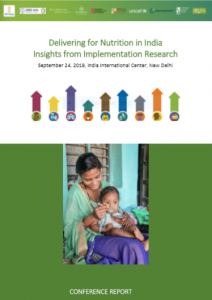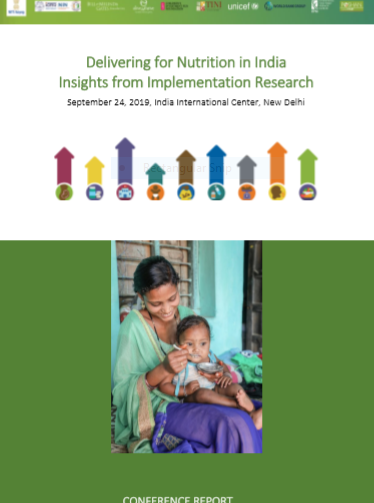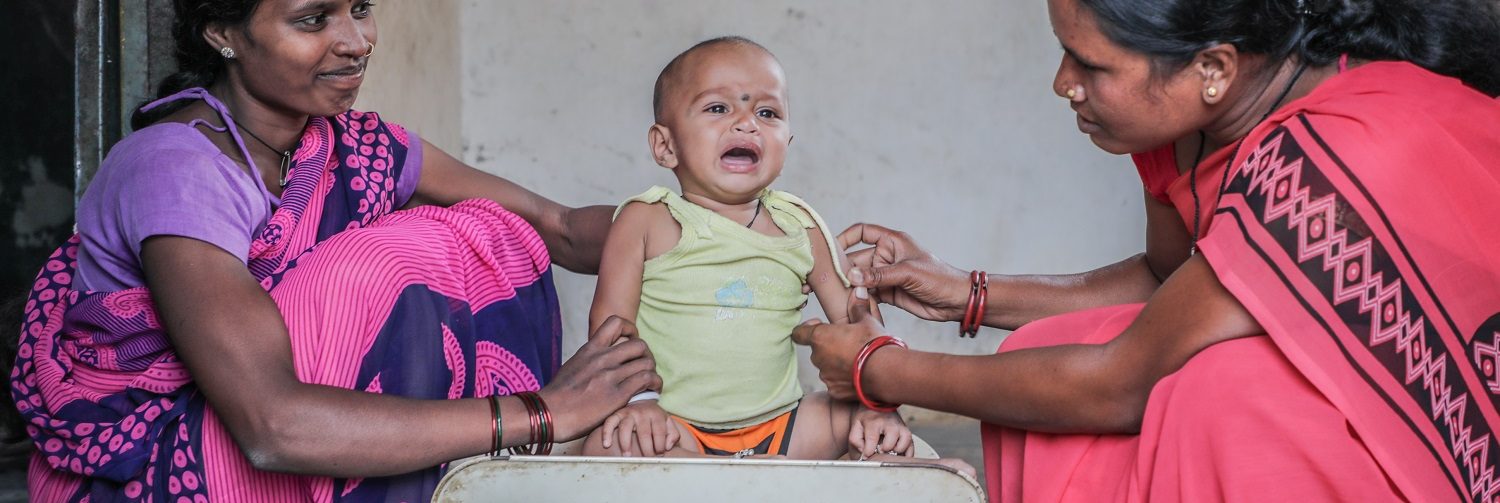
Click here to access the conference report
The implementation of India’s National Nutrition Mission, or POSHAN Abhiyaan, is centred around the key pillars of supporting the scale-up and convergence of services for vulnerable populations - technology (ICDS-CAS), Convergence Action Planning, Behavioral Change Communication/IEC advocacy, and training/capacity building. At a recently concluded conference on “Delivering for Nutrition in India: Insights from Implementation Research” which was co-hosted by the International Food Policy Research Institute (IFPRI), the National Institute of Nutrition (NIN), and NITI Aayog, along with Alive & Thrive (A&T), Bill & Melinda Gates Foundation (BMGF), Children’s Investment Fund Foundation (CIFF), United Nations Children's Fund (UNICEF), World Bank, and The India Nutrition Initiative (TINI), insights from implementation research emerged on addressing the challenges and proposed solutions to increasing the coverage and quality of essential nutrition interventions in India and strengthening the pillars POSHAN Abhiyaan. These insights and recommendations have been collated in a report, which can be accessed online.
Insights emerging from implementation research are crucial to bridge the knowledge gaps in the implementation of nutrition interventions. Key recommendations of this event for strengthening the core pillars of POSHAN Abhiyaan have been presented here.
In the opening session on the importance of implementation research for scaling up nutrition programs with equity and quality, it was highlighted that implementation constraints are a key obstacle to achieving impacts on nutrition at scale. There is a need for evidence on how to adopt, adapt, implement and scale-up nutrition interventions. It was therefore suggested to:
- Continue to invest in implementation research to identify the most effective ways to increase the coverage, quality and equity of essential nutrition interventions.
- Examine and understand the cross-cutting barriers and facilitators (intrinsic and extrinsic) in implementing nutrition programs.
The technology-related session examined recent evidence in the area of m-Health interventions, including ICDS-CAS. Key recommendations based on the evidence shared include the following:
- Immediate attention is needed to address challenges pertaining to internet, network, hardware, and software need to sustain implementation at scale.
- Technology replacement costs need to be built into the program to avoid obsolescence issues.
- Efforts are needed to strengthen the helpdesk, to support implementation of ICDS-CAS.
- Assess if elements of the Nutrition Surveillance System (NSS) being tested by NIN can be integrated into ICDS-CAS.
- Identify mechanisms for all frontline nutrition workers to use a common digital platform as ANMs, ASHAs and AWWs all serve the same beneficiaries.
- Build a strong data use culture to strengthen decision-making:
- Train state/district/block officials on the different types of data available to them and the use of data for decision making.
- Establish protocols for using data to provide feedback to support program improvements.
- Identify approaches to strengthen data quality to shift from a punitive monitoring approach.
Implementation research on maternal nutrition needs to continue and insights need to be consolidated as more evidence becomes available. Hence it was recommended that:
- Intensive systems strengthening efforts are needed to improve coverage and quality of maternal nutrition interventions, particularly on calcium supplements and gestational weight gain monitoring. Evidence from current ongoing efforts
- Cost of nutritious diets needs more attention. Identify approaches for making a nutritionally adequate diet accessible and affordable for pregnant and lactating women households. Combining nutrition BCC with cash transfers could be helpful but needs to be tested.
- Several ongoing studies and program pilots examining the issues above need to be completed and evidence synthesized to provide further guidance to maternal nutrition efforts.
In the session on scaling-up social and behavioral change communication (SBCC) through multiple platforms, the evidence emphasizes the need to (1) increase contact with high impact platforms and (2) address other barriers to behaviour change. To achieve this, the following were recommended:
- Devise and test strategies to close gaps and ensure high contact between 1000-day households and frontline workers.
- Identify and increase the use of platforms which have a high rate of reach including home visits, television, Village Health Sanitation & Nutrition Days (VHSNDs), community-based events, and posters/wall paintings. Ensure that high-quality content is delivered through these platforms.
- Build frontline worker capabilities to facilitate effective SBCC by explaining the reasons and rationale behind the SBCC messages and facilitate problem solving.
- Ensure that the key factors for bringing about behavioral change are tapped – right context, right platform and appropriate quality of interactions. It is also important to address behavioral determinants.
To address the range of issues that affect ICDS performance, the implementation research highlighted that factors such as frontline worker capacity, financing and governance were crucial to address. It was recommended that actions must be undertaken, on a serious footing, to do the following:
- Identify ways to improve governance mechanisms, close human resource gaps, and address financial planning needs to improve service delivery.
- Identify ways to increase the participation of communities to create ownership for service utilization, including processes such as social audits.
Focusing on food supplementation in the ICDS, including take-home rations (THR), cash or hot meals, a range of actions and more evidence-building were suggested.
- Take home rations: In view of THR’s potential contribution to child feeding practices, and the power it has to pull clients to ICDS services, the following need attention:
- Examine THR’s role in relation to the overall feeding patterns and infant and young child feeding behaviors.
- Explore different formulations for different age groups based on caloric and micronutrient requirements.
- Invest in research pilots on formulations and costs (also looking at efficacy and effectiveness).
- Ensure timely allocation of funds to improve take-home ration quality and timely distribution
- Put in place appropriate mechanisms to track distribution and plug leakages in the distribution of take-home ration.
- Hot cooked meals for women: Given mixed evidence base, consolidate and further build evidence to understand the role of the various one-full meal (OFM) programs on a range of maternal nutrition and outcomes.
- Cash transfers:
- Serious investments are needed to strengthen enrolment and payment flows of existing maternity cash transfer programs.
- Build evidence to understand the impact of existing or new cash transfers on child nutrition outcomes.
Overall, to improve the use of implementation research to enhance program coverage, equity and quality, it was recommended to focus implementation research efforts on the following key areas that are relevant to POSHAN Abhiyaan:
- How best to improve the range of complementary feeding behaviors in India.
- How to improve and strengthen current anemia reduction strategies in India
- Identify optimal intervention packages for reducing overweight and obesity among populations
- Foster consistent and solid evidence building to support evidence-based decision-making by policymakers.
- Test impact of concepts from behavioural economics (e.g. nudges) in facilitating behaviour change.
This event was an important milestone where the research community and policymakers came together to build a collective understanding of the current needs in nutrition implementation. Building a portfolio of research based on these recommendations will support the nutrition community in India in moving closer to its goal of improving nutrition for all.


